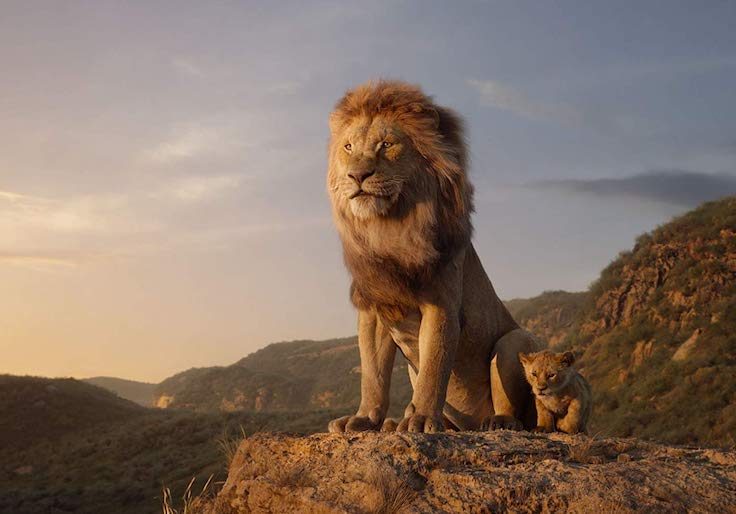Back in 1978, Superman's ad copy made a daring promise to the American moviegoer when it declared, "You will believe a man can fly." We did, and it was a smash. The ad copy for the new Disney remake of The Lion King might be "You will believe a lion can talk." You do, and the movie is going to make nearly $2 billion at the box office, trust me.
Disney has been trying to make us believe in the reality of computer-generated anthropomorphized creatures since Dinosaur in 2000, featuring CGI iguanadons inserted into live footage filmed in Asia and the Americas. Dinosaur was an interesting failure; you never really suspended your disbelief. Nearly two decades later, with The Lion King, the effort to trick you into thinking you are watching a nature documentary filmed in Africa has succeeded beyond its wildest imaginings. And not a single moment in it was photographed. Every second emerged from a computer.
The results are just jaw-dropping. The only movie trick in the last 20 years to have this kind of impact is the Marvel de-aging bit, with Samuel L. Jackson appearing to be 30 years younger than he was throughout Captain Marvel. Only once in The Lion King's two-hour running time did I have that moment where the "that looks fake" thought displaces you from the action and reminds you that you're watching a cartoon—and it came when two lion cubs are splashing in a river. In that moment, it's the water that looks fake, not the cubs.
So there's a strong argument for seeing this movie just to take in the technological wonder of what it's pulled off here. But there's something off about The Lion King. It tells exactly the same story as the original—about the arrogant but adorable royal cub Simba, who is gulled into believing he is responsible for the death of his lion-king father and runs away to a life of blessed irresponsibility as the kingdom he was supposed to lead falls into fascism and famine. And yet it lacks the cartoon's emotional impact.
The stage version of The Lion King has it in large measure because it went defiantly low-tech. It creates the world of the savanna and its inhabitants with puppetry and lighting and paper, invoking what can only be called childlike wonder at its transformative inventions and thus drawing you in emotionally. Since its opening, the stage version has earned $8.1 billion worldwide—which makes it, as Lee Seymour pointed out in Forbes, "the highest-grossing entertainment property in history, by a significant margin."
The stage version succeeds where the CGI version fails for a strange and simple reason.
There is a famous line of dialogue missing from the new movie, which is otherwise mindful of the need to re-create the cartoon's signature moments. It comes when the adult Simba is wrestling with himself about going back to his home and fighting his murderous uncle to restore his rightful place and save the Pridelands from his uncle's depredations. He looks to the sky and sees his dead father Mufasa in the stars.
"You have forgotten yourself and so you have forgotten me," Mufasa says. "Look inside yourself, Simba. You are more than what you have become."
The Lion King is the most beloved of all the Disney Renaissance animated pictures because it tells a simple and powerful story, the same story all great children's literature tells—the story of the journey from innocence to experience, from childish fecklessness to adult responsibility, from unseriousness to seriousness. And it does so without stinting on its portrayal of the joys of childhood, from the unconditional love of a parent to the mischievous play that gets out of hand to the deep friendships that cannot be torn asunder.
And it tells children, quite simply, that unless they grow and take the reins of adulthood, they will fall short. The childlike adult Simba is less than he should be because he avoids his calling. He is "more than what you have become"—and so will we all be if we do not heed the lesson.
It is baffling that writer Jeff Nathanson and producer-director Jon Favreau cut this line, which is the beating heart of The Lion King. But the fact that they did so helps explain why their technically astonishing movie dazzles the eye but fails to engage the hearts of its audience.
